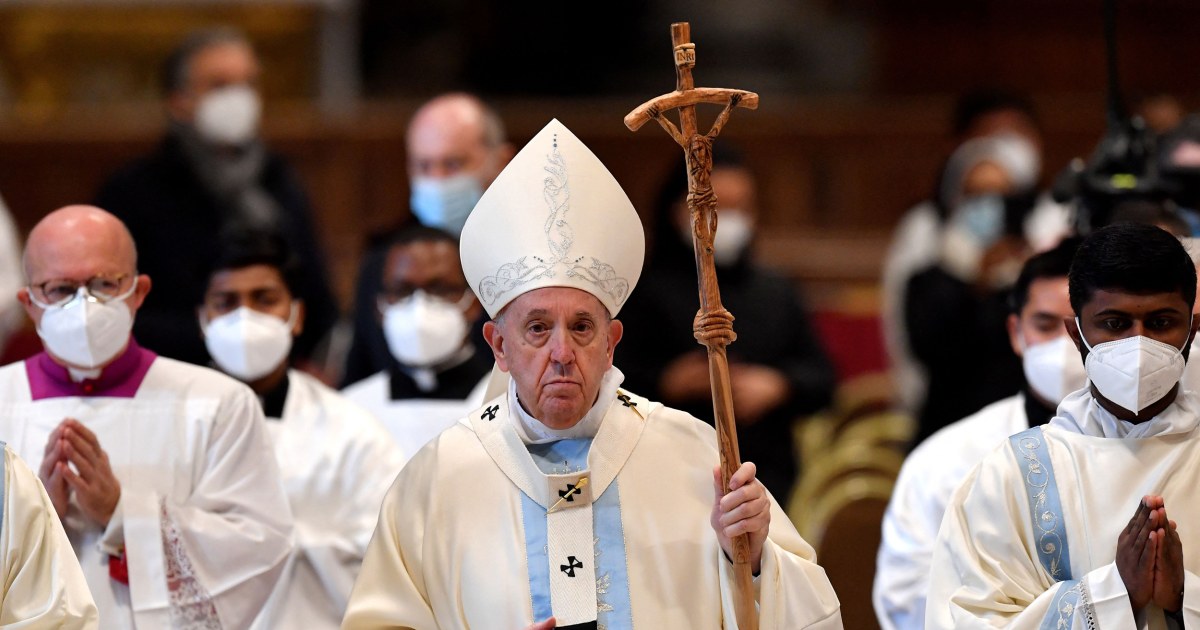
When Bishop Thomas J. Olmsted learned that something was amiss at a parish in his Phoenix diocese, he consulted the Vatican and then took action. The bishop informed his flock about the misconduct and included a web page where members who had been affected could get resources. The offending priest resigned at the beginning of February and, as news got out, the incident prompted international headlines.
Devout Catholics and priests who actually try to follow the Gospels should not be punished by a bunch of clerical nitpickers with too much power and too little compassion.
What massive malfeasance had taken place? Was it a case of child abuse or corruption? Hardly. At issue was a pronoun malfunction. For more than 20 years — ever since he had been ordained — the Rev. Andres Arango had been saying “We baptize you” instead of “I baptize you” in performing the sacrament of baptism.
This is hardly a world-shattering act. In fact, several priests and congregations had adopted this formulation over the years. But the Vatican’s Congregation for the Doctrine of the Faith, whose origins date to the Inquisition and which in 2012 scolded U.S. Roman Catholic nuns for their “radical feminist” views, took this language alteration seriously. So seriously that in 2020 it issued a “doctrinal note” finding that priests who altered the text were breaking church law, and that baptisms they had performed were not valid.
This started a domino effect that resulted in Arango’s resignation and continues to take down the faithful. Since baptism is believers’ ticket into the church — with its promise of eternal salvation — and makes them eligible to receive the other sacraments, the only solution the church is sanctioning is for parishioners to go through the ritual again. In some dioceses where the wrong wording was used, people need to get remarried or reordained after they’re rebaptized, since they weren’t Catholic when they received these sacraments the first time.
Arango, who appears to have been loved by his parishioners, indicated in his letter of apology that he had no idea he was violating church law. He didn’t explain why he altered the baptismal prayer, but it’s likely that’s how he was instructed to say it because at the time, the change in pronouns was not considered to be a serious breach of the rules.
Arango has voluntarily given up his work as a pastor so he can find and ensure that all the people affected by his mistake are rebaptized. That includes not only Catholics in Phoenix but also in California and Brazil where he also served. (According to the Phoenix diocese, Arango remains a priest in good standing.)
The Vatican’s ruling has been controversial since the 2020 decision, and the recent fallout from the Phoenix baptisms has proven critics right.
“Baptismal formulae have changed over centuries,” noted feminist theologian Mary E. Hunt in an email response to my questions. “No one knows what some priests said 500 years ago. But the intention of people to be baptized and to have their children baptized remains fairly constant – to give public expression to their welcome, membership, and responsibility in a faith community. The words are decidedly secondary to the actions of using water, blessing and welcome as visible signs of the grace of belonging.”
In the “restricted view” of the baptismal rite adopted by the Vatican, Hunt added, the “I” represents Jesus himself doing the baptizing, with the priest fulfilling the role of Christ. “Now people think of it as a communal action, hence the ‘We,’” she said of the change in wording.
Of course, that’s exactly what miffed the Vatican’s doctrinal police. The Vatican’s assessment of the pronoun substitution charges that the change was meant “to avoid the idea of a concentration of a sacred power in the priest to the detriment of the parents and the community.”
This is so infuriating. Devout Catholics and priests who actually try to follow the Gospels should not be punished by a bunch of clerical nitpickers with too much power and too little compassion.
The church could have decreed that any priest who changes the wording was violating canon law but that the baptisms were valid. “[T]o say that if someone says ‘we,’ that the baptism is invalid? I think it’s nuts,” the Rev. Thomas Reese, a Jesuit journalist and an author, told The Washington Post.
It’s not nuts, however, if what you really want to protect is not the sacrament of baptism but the priest’s starring role in the ritual. “The current morass is the result of an ecclesial fetish for power,” Hunt contended.
And that’s what makes this hyperventilating about a minor language tweak so concerning. This incident calls attention to something very wrong in the institutional church, and it isn’t the fact that some priests varied the baptismal prayer.
Ironically, I’m aware of no church official who has challenged the validity of the baptisms or other sacraments that predator priests presided over.
Rather, the baptism reversals represent what Pope Francis has termed one of Catholicism’s greatest problems — clericalism, the conviction among many priests that they are superior to all other Catholics. The priests who varied the ritual were not trying to defy the church; Reese speculated that they wanted to be more inclusive and less formal. For years, no one paid any attention to the slight revision in wording, and no one thought it would make a baptism invalid.
But when the change came to the attention of Vatican scrutineers, suddenly there was concern about its larger ramifications. Hunt noted that involving the church community in baptism “would mean that more [members of the church] than the priest embody Jesus and thus have the power and responsibility to baptize. Heaven forfend, that would include women.”
Clericalism has done a lot of damage. It’s part of the reason that the church has taken years to fully face up to the child abuse crisis. Church leaders feared that scandal would taint the institution, so secrecy seemed more important than protecting future victims from priests credibly accused of abuse. “We showed no care for the little ones; we abandoned them,” Francis wrote in 2018.
Ironically, I’m aware of no church official who has challenged the validity of the baptisms or other sacraments that predator priests presided over. The church has rightly determined that the sinfulness of the priest does not affect the validity of the sacraments he administers, since it is the presence of Christ that gives the sacraments their power. Surely it would seem that the church could apply a similar logic to unintentional errors that have cropped up in the administration of baptism.
Francis has also linked clericalism to a rigidity that tends to insulate priests from the real-world impacts of their actions. That’s certainly the case for the Vatican’s judgment that not only penalized priests for changing the words of the rite but also harmed Catholics who in good faith baptized their children and had a church wedding.
At a parish meeting in Michigan about the baptism issue, one woman asked the clergy in charge: “Why do you think so many Catholics are leaving the church? This is a great example why. This is just awful.”
At a time when war, climate change and a pandemic challenge the human race, there’s something very wrong about these punctilious pronouncements about pronouns that can wreak so much havoc on good Catholics. It also makes me wonder whether the Vatican’s powerful readers of the fine print actually believe in a loving and merciful God. Their conduct makes me sincerely doubt that they do.
Source: | This article originally belongs to Nbcnews.com









